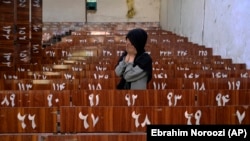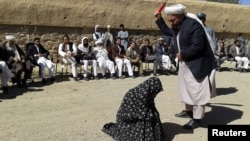
Welcome to The Azadi Briefing, an RFE/RL newsletter that unpacks the key issues in Afghanistan. To subscribe, click here.
I'm Frud Bezhan, regional desk editor for Iran, Afghanistan, and Pakistan. Here's what I've been tracking and what I'm keeping an eye on in the days ahead.
The Key Issue
The Institute for Economics and Peace has named Afghanistan as the least peaceful country in the world for the sixth consecutive year.
In its 2023 Global Peace Index released on June 28, the international think tank said “violence is still widespread throughout the country,” although it noted that the “level of conflict has dropped considerably” since the Taliban seized power in 2021.
“Afghanistan recorded the largest reduction in deaths from armed conflict in 2022 with conflict-related deaths falling 90.6 per cent, from almost 43,000 to just over 4,000,” the index said.
But the think tank noted that the security situation in Afghanistan remains uncertain and terrorism continues to be a “serious security concern.”
The index warned that there was a “strong possibility” that the conflict between the Taliban and the rival Islamic State-Khorasan (IS-K) extremist group could escalate. IS-K remains the biggest threat to the Taliban, carrying out deadly attacks against Taliban officials and the country’s religious minorities.
The index also noted that a growing number of local militias have joined the Afghan National Liberation Front and the Afghan National Resistance Front, armed groups that have been waging a low-level resistance to Taliban rule.
The Global Peace Index, which ranks 163 countries, measures the state of peace according to three values: the degree of militarization, the level of security, and the extent of ongoing conflicts.
Why It's Important: Since regaining power, the Taliban has repeatedly claimed that it has eliminated IS-K in Afghanistan and boasted about restoring law and order in the war-wracked country.
But the continuing violence in Afghanistan, as documented by the Global Peace Index as well as the United Nations, has busted the Taliban’s narrative that it has established complete security.
The UN mission in Afghanistan (UNAMA) said in a June 27 report that it had documented significant civilian casualties in Afghanistan since the Taliban takeover, despite a sharp reduction compared to previous years.
UNAMA said there were 3,774 civilian casualties, including 1,095 people killed in violence in the country, between mid-August 2021 and the end of May 2023.
Mohammad Naeem Ghayor, an Afghan security expert, told RFE/RL’s Radio Azadi that although the security situation in Afghanistan has improved, there is not “real peace and stability” in the country.
What's Next: The Taliban is likely to face growing internal resistance to its rule. The militants have rolled back many rights, carried out widespread human rights abuses, and sidelined many of the country’s ethnic and religious groups.
The militant Islamist group has also been undermined by widening internal rifts and international isolation.
The Week's Best Story
Muslims across the world celebrated Eid al-Adha this week. But the festivities were muted in Afghanistan, where many people are struggling to survive amid a devastating humanitarian and economic crisis. The Taliban’s severe restrictions on women’s freedom of movement, including a ban on them going to public parks, also hampered celebrations.
What To Keep An Eye On
Amnesty International called on the Taliban to release Matiullah Wesa, a widely known and respected education rights activist who was beaten and arrested by the Taliban in Kabul on March 27.
“Today marks three months since education rights activist Matiullah Wesa was arbitrarily arrested by the Taliban de-facto authorities,” Amnesty said in a tweet on June 27.
“His continued detention is a clear violation of the rights to freedom of expression and peaceful assembly under international human rights law. The Taliban de- facto authorities must immediately and unconditionally release Matiullah Wesa.”
His arrest on charges of “anti-regime activities” sparked an international outcry.
In a written message to Radio Azadi, Attaullah Wesa said his brother’s arrest was unjustified and demanded that the Taliban release him.
Why It's Important: Wesa’s continued detention has served to highlight the Taliban's intensifying crackdown on dissent.
In recent months, the militant group has specifically targeted educators, including Rasul Parsi, a former university professor in the western city of Herat, who had written Facebook posts critical of the Taliban.
In February, the Taliban arrested former university professor Ismail Mashal after he distributed books to women and girls in Kabul to protest the Taliban’s ban on women attending university and girls above the sixth grade going to school. Mashal was later released.
That's all from me for now. Don't forget to send me any questions, comments, or tips that you have. You can always reach us at azadi.english@rferl.org.
Until next time,
Frud Bezhan
If you enjoyed this briefing and don't want to miss the next edition, subscribe here. It will be sent to your inbox every Friday. Please note that the newsletter will not be issued next week due to public holidays. It will return on July 14.



